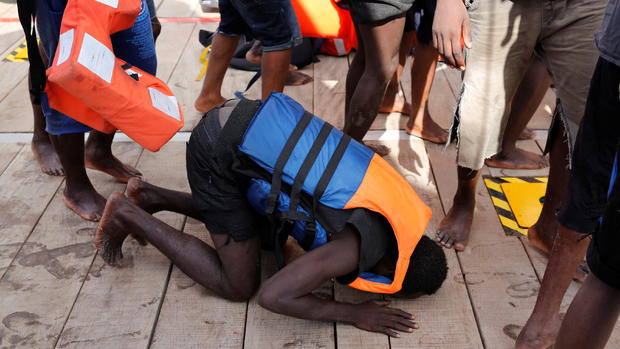More than 200 bodies recovered from ill-fated ship
ROME -- Italian navy officials say they have recovered 217 bodies from the hull of a migrant ship that sank off Libya last year in a tragedy that sparked the EU to beef up Mediterranean rescue operations.
Italian authorities raised the ship from the seabed last week and have been working to remove and identify the bodies ever since. In a statement Thursday, the navy said 52 autopsies had been performed on the 217 bodies pulled out so far.
Some of the 28 survivors of the April 18, 2015 wreck had said as many as 700-800 people were aboard, leading officials to label it one of the worst known tragedies of the Mediterranean migrant crisis.
Around 200 bodies were initially recovered; after officials saw the ship's dimensions, they suggested about 300 remained.
Most passengers were locked below decks; only 28 survived.
The sinking sparked renewed outrage and soul-searching in European capitals, which agreed to send in EU naval reinforcements to cast a wider safety net to try to rescue the waves of migrants leaving Libya on smugglers' boats.
While tens of thousands have been rescued, thousands of others have drowned: During one particularly deadly three-day period in May, an estimated 700 migrants died, including those aboard a huge, overcrowded fishing ship that capsized as rescuers filmed the horror.
Most of the migrant boats that sink are never recovered, and the dead are never exhumed or identified. Soon after the 2015 tragedy, though, Italy pledged to recover the wreck and said it hoped the exercise would help create a European network to identify victims by cross-checking data.
Italy's navy used a specially designed robotic apparatus to raise the boat, which was towed to port in Sicily.
Italy's southern islands are the main destinations for countless numbers of smuggling boats launched from the shores of lawless Libya each week packed with people seeking jobs and safety in Europe.
Humanitarian organizations and investigating authorities typically rely on survivors' accounts to piece together how many people may have been killed during a capsizing, relying on overlapping accounts to try to establish a level of veracity.
